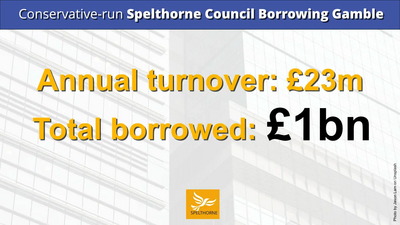"How was Spelthorne - annual spending £23 million - allowed to borrow £1 billion?"

Spelthorne Council was behaving outside of the spirit of the guidance
Public Accounts Committee hear more evidence about excessive borrowing
The House of Commons Public Accounts Committee (PAC) held a second hearing into Local Authority commercial investments on 15th May, with Spelthorne very much in the minds of the committee members and all the witnesses. With £1bn of borrowing, Spelthorne stands out from other councils and the committee and the witnesses did not view this as a good thing.
Lib Dem finance spokesman, Cllr Lawrence Nichols, said "From the evidence given to the committee it appears that Spelthorne Council did not want to listen to the guidance of the DHCLG and ignored the potential risks of excessive borrowing. The current crisis has brought the Council's gamble into stark relief and there is no certainty of a good outcome. There is an urgent need for detailed consideration of the implications for the Council and the plans to manage the situation, and this cannot happen behinds closed doors, which is the preferred method of working for this administration."


The key witness for the session was Jeremy Pocklington, the Permanent Secretary for the Ministry of Housing, Communities and Local Government (DHCLG). Asked by Conservative MP Sir Geoffrey Clifton-Brown how much borrowing was too much for a local authority, he responded that the Treasury is currently reviewing on how to control this type of borrowing.
Sir Geoffrey then said "The Treasury review is a bit like bolting the stable door after the horse has bolted, isn't it? How was a council like Spelthorne, which has annual spending of roughly £23 million, allowed to borrow £1 billion, largely-almost exclusively-through the Public Works Loan Board? How could that situation ever have been allowed to occur?
In his response, Mr Pocklington said "I do not think that example is consistent with the spirit of the prudential framework within which we operate. The Department, the Treasury and CIPFA took action to strengthen the prudential framework following the NAO Report in 2016 and the Public Accounts Committee hearing at the time. A number of important changes were made but, ultimately, there was not a binding constraint on the actions of a council like the one you outlined. The Department had considerable engagement with the council but, ultimately, it did not have the power, in advance, to stop a council borrowing that money.
So according to the DHCLG Permanent Secretary, Spelthorne Council was behaving outside of the spirit of the guidance and knew better than central government.
Sir Geoffrey went on to criticise the rate of return that Spelthorne is achieving. He said "Spelthorne tells us that it only has a net return of 1% on that £1 billion of borrowing …… A 1% return is not sufficient for the additional risk that is involved in investing in commercial property." Sir Geoffrey is a Conservative MP and a Chartered Surveyor, so hardly uninformed or likely to be biased against a Conservative-controlled Council.
Mr Pocklington replied "In future, assuming that we implement the proposals set out in the [Treasury] consultation, councils will be prevented from investing in commercial property and from accessing the Public Works Loan Board. That, we think, will stop councils not only borrowing, in particular but investing in these sorts of commercial property arrangements that are primarily for yield."
Later in the hearing Mr Pocklington stated that "The Department has been clear that councils should not borrow purely for yield. That was made very clear in the changes that we made to the prudential framework consulted on in 2017 and introduced in 2018". So according to the most senior Civil Servant in DHCLG, when Spelthorne was borrowing money for buying commercial investment properties, it was acting against government guidance. In future such behaviour will be prohibited - "We will severely restrict councils' ability to borrow for the sorts of out-of-area investments that you are alluding to, which are for yield rather than for policy reasons".
Later in the hearing, Will Garton, the Director for Public Services in the Treasury said that "we give very specific guidance that debt-for-yield activity is not acceptable". In response to another question he said "I think we should be concerned if we think that local authorities have not pursued an optimal value for money strategy in the last three years in particular. That is why we are doing something about it." The behaviour of Spelthorne has caused the government to have to put regulations in place to stop this inappropriate behaviour.
Towards the end of the hearing Mr Pocklington took one final swipe at borrowing for commercial investment - "Can I draw a distinction between a very small number of councils that have borrowed disproportionately, for example relative to their core spending power? There is a handful that is very well-known and highlighted in the report; you raised one at the start of this meeting. That is what we are most concerned about in the Department; it is the Spelthornes of this world."
A full transcript of the session can be found here: Committee evidence on 15th May 2020
